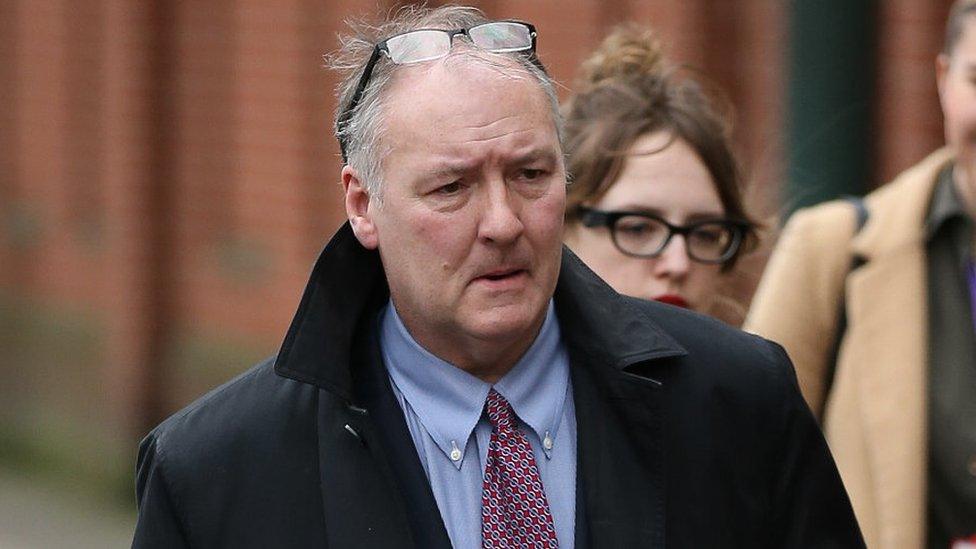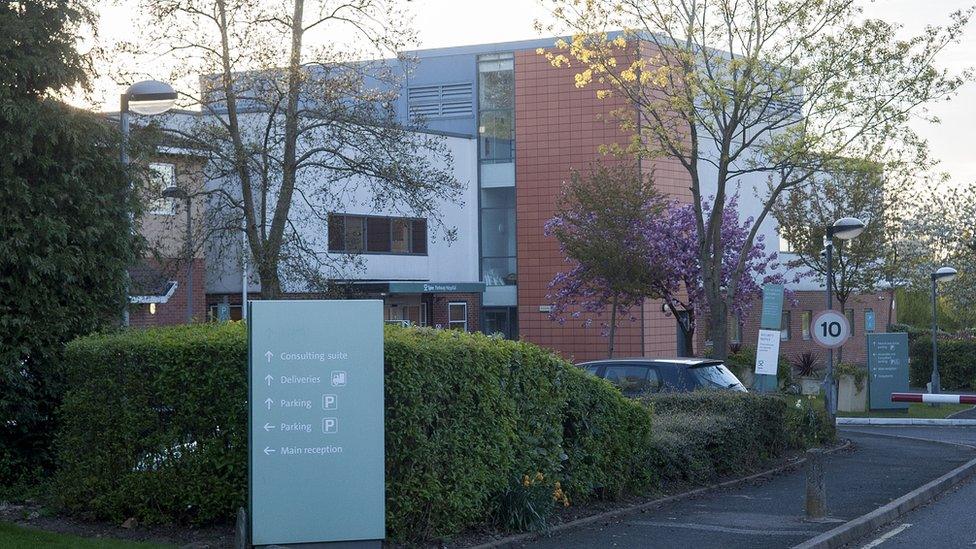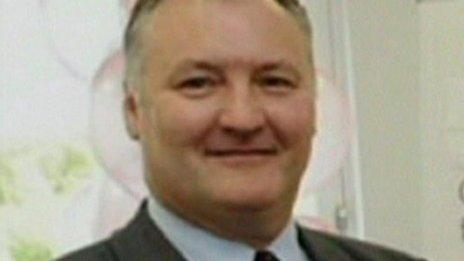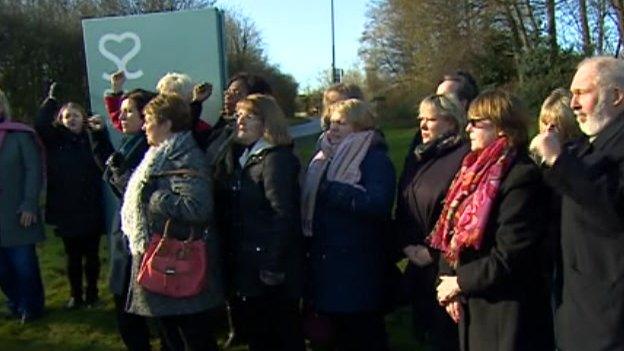Breast surgeon Ian Paterson case: 'Hundreds' of other victims
- Published

Hospital authorities have been accused of failing to protect patients from Ian Paterson
Hundreds of patients will seek compensation after a breast surgeon was convicted of carrying out needless operations, solicitors have said.
Ian Paterson, 59, was found guilty of 17 counts of wounding with intent, relating to nine women and one man in the West Midlands.
Thompsons Solicitors said 350 women were now bringing a High Court case.
A lawyer who investigated Paterson asked how he could "get away with what he was doing" in the NHS for so long.
Paterson, of Altrincham, Greater Manchester, was also found guilty of three counts of unlawful wounding at Nottingham Crown Court on Friday.
The surgeon, who treated thousands of patients during his career, exaggerated or invented cancer risks and claimed payments for more expensive procedures in some cases, the court was told.
Paterson 'psychopathic like Shipman'
The seven-week trial heard the accounts of 10 victims - representing a sample of those Paterson treated - operated on between 1997 and 2011 at the privately-run Little Aston and Parkway hospitals in the West Midlands.
Jurors were not told Paterson carried out hundreds of unnecessary operations on NHS patients, with a hospital trust paying out £17.8m in damages and legal costs.
He was granted bail and is due to be sentenced in May.
Law firm Slater and Gordon said there could be "hundreds, if not thousands" of other potential claimants.

'He stuck a knife in me unnecessarily'
Jade Edgington said the experience left her feeling "violated".
Jade Edgington was 16 when she found a lump in her breast and had four operations by the time she was 19.
She has now found out three of those procedures were not necessary.
"You feel almost a bit violated - like, well hold on a minute, essentially someone has stuck a knife in me unnecessarily," said Ms Edgington, 28.
"He made you feel completely like you were in the best hands that you could possibly be in."
She said she had been left physically as well as emotionally scarred.
"All that could have been avoided - what was it for?"

Police said some of his victims believed Paterson wanted to "play God" with their lives and it is believed the surgeon may also have been driven by financial gain.
As a result of his work, he owned a luxury home in Birmingham's Edgbaston area, numerous properties in Cardiff and Manchester and a holiday home in the US.
Paterson invented what he called a "cleavage-sparing mastectomy" - leaving breast tissue behind to achieve a better cosmetic effect - and performed it on many of his patients.
By doing so, he left them in great danger of developing secondary cancer, jurors heard during the trial.
Linda Millband, from Thompsons Solicitors, said: "There are an enormous number of people who have suffered through having the incorrect diagnosis and have had totally erroneous treatment, and there are others who have been over-treated...
"Our case is not only against Mr Paterson, it is also against Spire Hospitals and the Heart of England Foundation Trust - and our allegations are that neither of the hospital authorities took the necessary steps to protect our victims and clients."
'Life sentence of anxiety'
An independent report in 2013, external, by lawyer Sir Ian Kennedy, found concerns about Paterson dated back to 2003 but were not dealt with for four years.
Sir Ian told BBC Radio 4's Today programme: "This is an unalloyed tragedy, but there are wider implications - how was it for so long, in the National Health Service, that Mr Paterson was allowed to get away with what he was doing?"
He said lessons "must be learned", adding: "The NHS is fine, but there continue to be dark corners, such as the one we're exposed to now, where things continue to go wrong."
He said "a number" of issues need to be looked at, including "the quality of leadership" and "the amount of information which comes out from what people are doing and reaches the board".
Debbie Douglas: "He has mutilated me"
Sir Ian said that while there had been colleagues of Paterson who tried to bring the matter to managers' attention, there also had to be "a system of confidence and good management of people so they know where to go and feel confident they can do so".
He stressed that "the welfare and care of patients" was paramount, rather than budgets or "keeping x or y happy", adding: "The women were central, and that was lost sight of."
"There are things going wrong in the National Health Service, all the time," said Sir Ian, though he pointed out this was not unusual for such a large organisation.
"What we have to concentrate upon is stopping them, finding out early and so on. These women have been given a life sentence of anxiety."

In 1996, Paterson was suspended by a previous employer, but two years later he was appointed to the Heart of England NHS Trust
In 2004, an internal report on his conduct made recommendations that were not acted upon, and he continued to operate until mid-2011, the Kennedy report said. He was eventually excluded by the trust and 642 patients were recalled
In 2012 he was suspended by the regulator the General Medical Council

He said it was important to "stand up to charismatic, powerful, apparently good-performing professionals".
"Lots of people in the National Health Service do the easy job - they work around them. 'Oh yes, he's difficult, we'll try another route'.
"That doesn't speak to the interests of patients."
In total, Paterson operated on 4,424 people, although he treated thousands more privately.
What is cleavage-sparing surgery?
Emma Doughty, clinical negligence solicitor for Slater and Gordon, said the true number of Paterson's victims was hard to gauge.
"Although we have seen hundreds of claimants, God knows how many this actually affects," she said.
"There are hundreds if not thousands of claimants (between various law firms) and then we have got to think about people who haven't come forward, people who have died and so on.
"It's on a huge scale."

Paterson was found guilty of wounding patients at Spire private hospitals
Spire Healthcare, which runs the hospitals at Little Aston and Parkway, said: "What Mr Paterson did in our hospitals, in other private hospitals and in the NHS, absolutely should not have happened and today justice has been done.
"We would like to reiterate how truly sorry we are for the distress experienced by any patients affected by this case."
Heart of England NHS Trust said: "We welcome the verdict and appreciate the distress caused to Ian Paterson's patients and families."

Are you affected by the issues raised in this story? Please email haveyoursay@bbc.co.uk, external with your experiences.
Please include a contact number if you are willing to speak to a BBC journalist. You can also contact us in the following ways:
Whatsapp: +44 7525 900971
Send pictures/video to yourpics@bbc.co.uk, external
Tweet: @BBC_HaveYourSay, external
Send an SMS or MMS to 61124 or +44 7624 800 100
- Published28 April 2017

- Published4 March 2014

- Published3 March 2015

- Published19 December 2013
